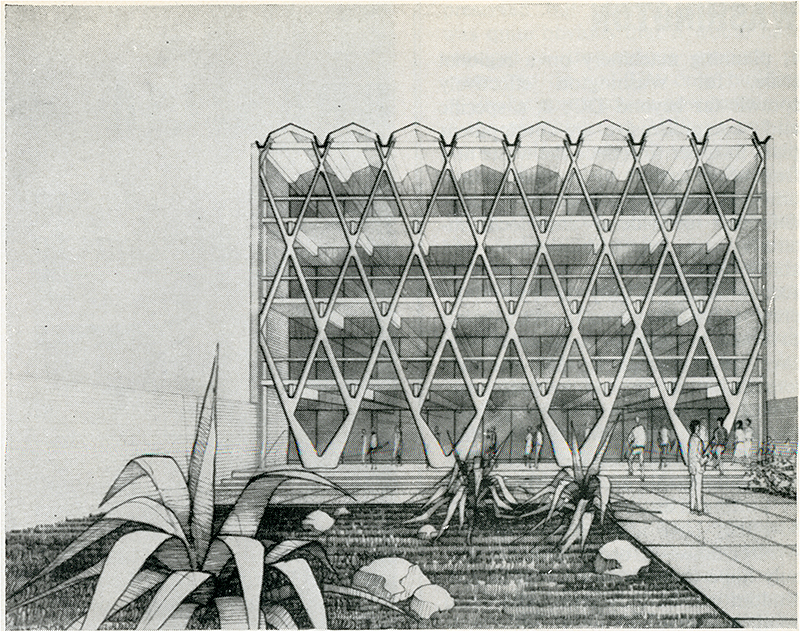PAST TALKS 2021
12 October 2021
MARCO MORO
Universtity of Cagliari
Respondent: Alessandro Benetti (Politecnico di Milano, Rennes 2)
![]()
The Inhabited Envelope, or the Past of An
Erosion. Enrico Tedeschi Architect-Educator-Entrepreneur and the Learning Environment of Universidad Libre
De Mendoza (1960-67)
MARCO MORO
Universtity of Cagliari
Respondent: Alessandro Benetti (Politecnico di Milano, Rennes 2)

Between 1963 and 1966, several images of a relatively small university building circulated in the pages of “The Architectural Review” and “L’Architettura Cronache e Storia”. Fragments of a V-shaped structural membrane situated that experimental proposal from Northern Argentina within purely formal categories (non-orthogonal)or technological performances (quake-proof)emphasizing the anti-conformist criteria of a completely permeable envelope. In 2019, similar considerations accompanied the investiture of that small building as a National Historic Monument, with the now iconic FAUM (Facultad de Arquitectura de la Universidad de Mendoza) instrumentally readapted to the contemporary environmental discourse or claimed as direct descendant of its author’s theoretical framework, namely the Italian-born architect Enrico Tedeschi (1910-1978).
Certainly, one cannot ignore the manifest concomitance with the first publication of Tedeschi’sTeoría de la Arquitectura (Buenos Aires, 1962), which consolidated his position as initiator of architectural history and theory circles in Latin America. However, Mendoza’s university project cannot be explained without considering Tedeschi operating from within the local bureaucratic apparatus: (1) his appointment given by the Municipality for the plan of Gran Mendoza, (2) his managerial tasks within the university institution he headed including well-developed fundraising skills, (3) his complicity with local construction industry that was introducing peculiar prefabrication methods in the region.
More than a mere historical finding, “The Inhabited Envelope” will be presented as chapter of a critique of learnification in architecture. The 21st century has witnessed, in fact, a growing debate around distributed learning, with the concept of ‘informality’ taking the traits of a real pedagogical mandate not devoid of contradictions: on the one hand, the euphoric rediscovery of radical pedagogies that had challenged the authoritarianism of university institutions to emancipate from the production logics of the bureaucratic state; on the other hand, the often contrived revival of informal usages of educational spaces instrumentally adjusted to the production logics of a now flexible and precarious reality. Against this backdrop, some peripheral exponents of the post-war architectural discourse dispersed in the countergeography of Latin America traced a trajectory of design episodes in which education was, primarily, intended as a project. Moreover, this project reveals education as a contested territory between bureaucratic and anti-bureaucratic structures when their still permeable boundaries made the concept of informality coincide with the most elaborated, complex and ambitious object of this contention.
* * *
Fuck the Context:
Understanding the Idea of Polis through Commoning
MATHILDE REDOUTÉ
AA School of Architecture
Respondent: Nicole de Lalouviere (LUS, ETH)

For the last 30 years, the concept of common is making a come-back. It is not a return but a “rediscovery” as David Bollier stated or a “rebirth of the theme” if we follow Dubravka Sekulic’s argument. This phenomenon has been confirmed by the Nobel Prize of economy given to the American researcher Elinor Ostrom in 2009 for her fieldwork on the subject, which occurred a year after the financial crisis. Since then, scholars from all fields have taken up the subject, implementing and developing it following their own knowledge, which had the double effect to widen the concept but also brought a lot of confusion and uncertainty about the definition.
When it comes to architecture the use of it is still problematic in the sense that there is not one clear and global definition to understand it, nor any design model to apply, which has the direct impact of weakening the debate. Faced with the exponential growth of the population, the question of cohabitation through the sustainability and right to access the formal and informal resources have changed the geography of the world. From David Chipperfield “Common Ground” biennale in Venice 2012, through Seoul’s “Imminent Commons” in 2017 until 2021 Venice Biennale “How will we live together?”, the question seems reluctant and primordial.
The goal of this thesis is thus to understand the concept of commoning by emphasizing the latent tension between sharper economic and political points of view to address the more radical vision of collective actions. What to rely on? What are the first needs? How to manage our household planet? Who owns it? What are the agencies at stake? How commons as a mean of production and reproduction are impacting theenvironment? How commoning, as a self-organized system of governance beyond market and state, is shaping cities?
When it comes to architecture the use of it is still problematic in the sense that there is not one clear and global definition to understand it, nor any design model to apply, which has the direct impact of weakening the debate. Faced with the exponential growth of the population, the question of cohabitation through the sustainability and right to access the formal and informal resources have changed the geography of the world. From David Chipperfield “Common Ground” biennale in Venice 2012, through Seoul’s “Imminent Commons” in 2017 until 2021 Venice Biennale “How will we live together?”, the question seems reluctant and primordial.
The goal of this thesis is thus to understand the concept of commoning by emphasizing the latent tension between sharper economic and political points of view to address the more radical vision of collective actions. What to rely on? What are the first needs? How to manage our household planet? Who owns it? What are the agencies at stake? How commons as a mean of production and reproduction are impacting theenvironment? How commoning, as a self-organized system of governance beyond market and state, is shaping cities?